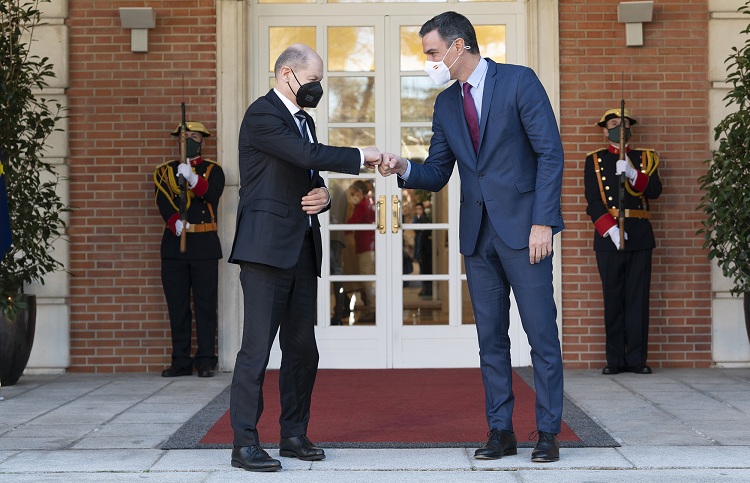Eduardo González
Spain and Germany will hold in the first half of 2022 the first Spanish-German Summit in seven years, as announced yesterday by the President of the Government, Pedro Sánchez, and the Chancellor of the Federal Republic of Germany, Olaf Scholz, after meeting at La Moncloa Palace, in Madrid.
“We have decided that we are going to hold again, when the agenda allows it, the bilateral Summit, which this year will be held in Spain,” said Sánchez at the press conference following his meeting with Olaf Scholz, the first since the new German Chancellor took office last December. This Summit “will help to further boost intense bilateral relations,” as will the 2022 Frankfurt International Book Fair, at which Spain has had “the great honor of being selected as the guest country,” he continued.
“Our bilateral relations are extremely dense and are evidenced by the thousands of Spanish and German citizens who have put down roots in the other country and by the more than 11 million German tourists who visited Spain annually before the pandemic and who we hope will be able to return to our country,” he continued. Besides, Germany is Spain’s second largest trade client and its main supplier, with a trade balance that in 2020, the worst year due to the pandemic, exceeded 63 billion euros. There are currently more than 1,325 German companies installed in Spain and around 260 Spanish ones, with interests in the automotive, construction, infrastructure, renewable energy and water management sectors. There is also growing cooperation in the scientific and digital fields.
“Spain and Germany are very good friends and, as a further step to secure our future relations, we will once again hold the bilateral summit,” Scholz said. “The working teams are doing everything so that it can be held as soon as possible,” he added.
According to Moncloa, the summit will be held in the first half of this year. The last Spanish-German Summit was held in the summer of 2015 in Berlin. In June 2018, the then German Chancellor, Angela Merkel, and President Pedro Sánchez announced in Berlin their intention to resume bilateral summits “presumably in 2019”, but the electoral appointments in the two countries and the COVID-19 pandemic prevented their celebration. Germany holds bilateral summits (Konsultationen) with a very small group of countries, including France, Italy, China, Israel, Poland and Russia (currently interrupted).
On the other hand, Sánchez and Scholz addressed several issues on the EU agenda, such as the European Commission’s proposal on “green taxonomy”, the Pact on Migration and Asylum and the reform of European economic governance, in which “both countries agree that the fiscal rules are too complex and difficult to comply with in the context of the pandemic” and, therefore, “the Government of Spain considers that it is necessary to reform them taking into account two considerations: Responding to the climate challenge and digitalization and guaranteeing the sustainability of finances in the medium term,” stated Sánchez. In this regard, the German Chancellor defended the continuity of the Stability Pact, which has acted as “the necessary framework for the recovery fund” after the pandemic.
During the bilateral meeting, Sánchez and Scholz also discussed the evolution of the pandemic, the preparation of the NATO summit, which will be held in Madrid next June and in which “Germany will contribute to the maximum to make it a success”, according to the Chancellor; the community energy policy, regarding which both noted their “different visions”, according to Sánchez; and Russia’s threats to Ukraine. “It worries us and it is very serious,” Scholz warned. “It is very important that there be unequivocal steps by Russia for the de-escalation of the situation,” because “a military aggression to count Ukraine would bring serious political and economic consequences, and we have to do our best to avoid this extreme that would only cause suffering for everyone,” he added.
Coinciding with the official visit of Olaf Scholz, the Minister of Justice, Pilar Llop, received yesterday the German Ambassador to Spain, Wolfgang Dold, with whom she discussed, among other topics, “the different models that are contemplated at the European level for the renewal of constitutional bodies and the importance of their renewal for the strengthening of the Rule of Law”, as reported by the Ministry.







